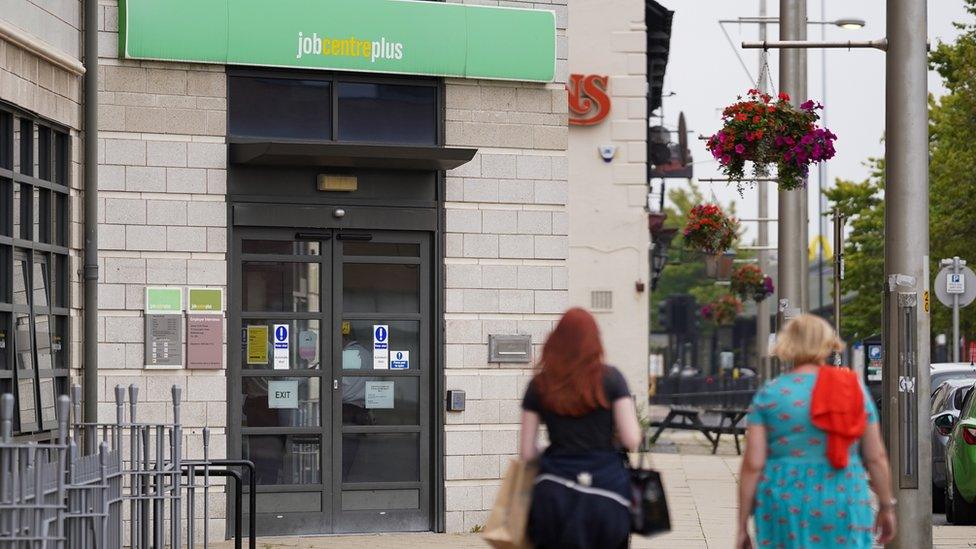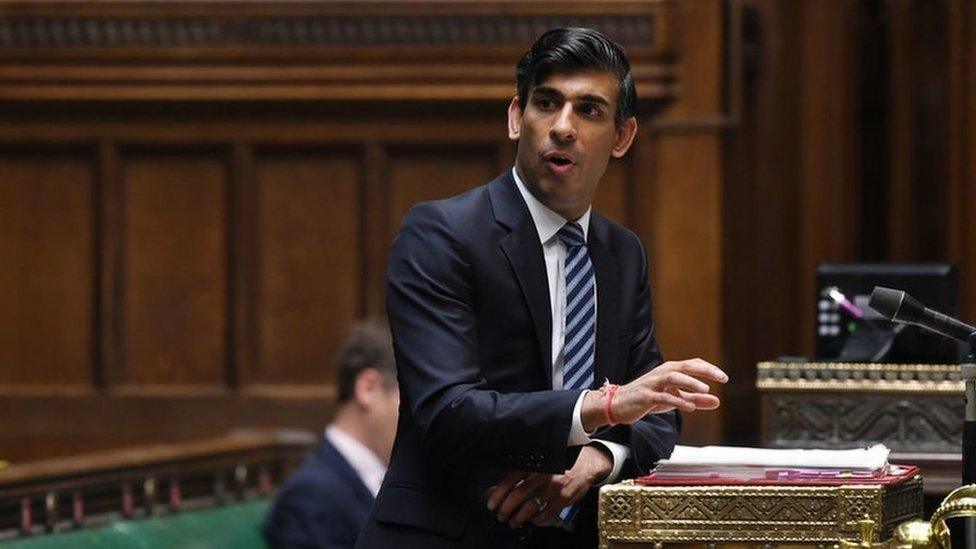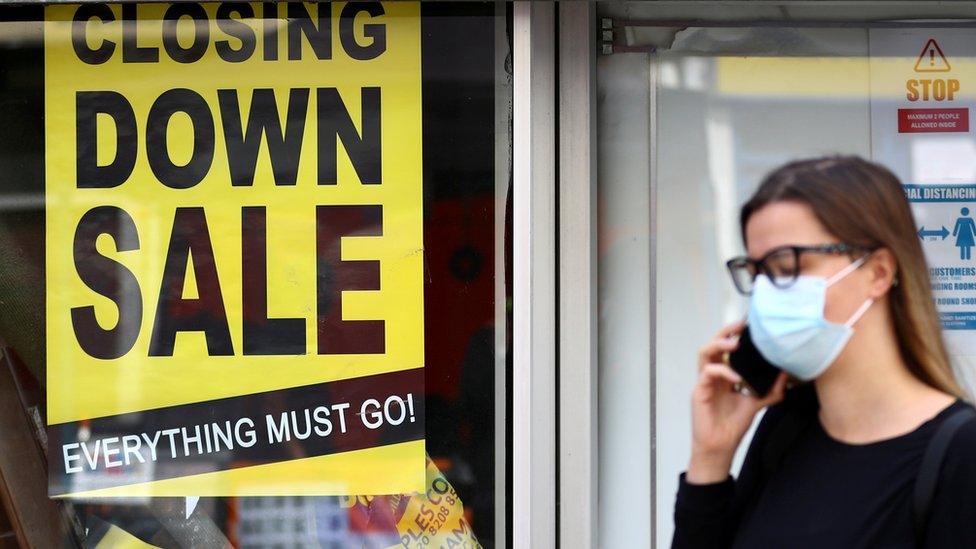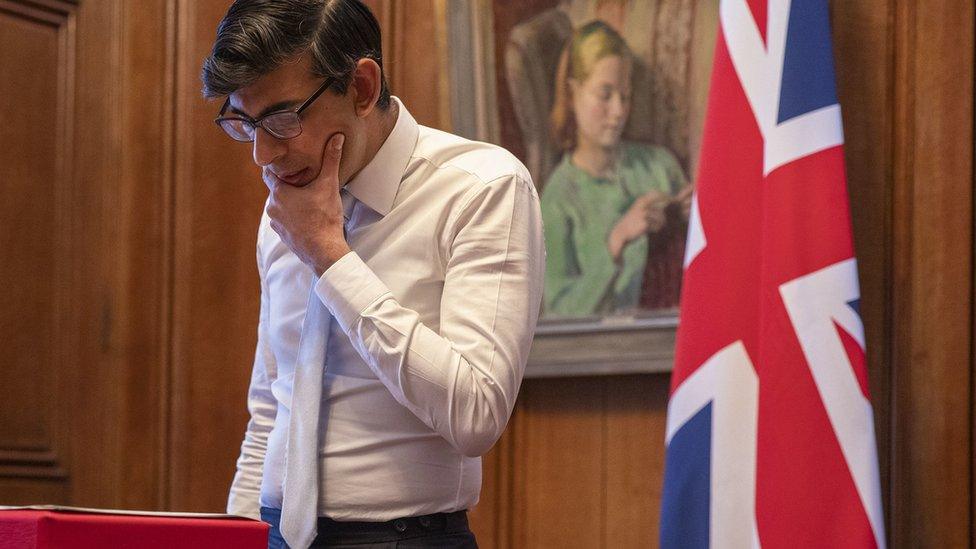What the spending review means for Scotland
- Published
- comments
Chancellor Rishi Sunak: Coronavirus to leave 'long-term scarring' on UK economy
Chancellor Rishi Sunak said the UK's "economic emergency" has "only just begun".
In his Spending Review he outlined the scale of borrowing to tackle the health and economic crisis caused by Covid.
The Office for Budget Responsibility (OBR) has told the UK Chancellor the economy is on track to shrink 11.3% this year - the biggest fall for more than 300 years.
It's not expected to make up lost ground until the end of 2022.
Borrowing this year is on course to hit nearly 20% of all output, when 3% is seen as a safe level. That's £394bn - by far, the highest in peacetime.
Block grant
For Scotland, Mr Sunak said the block grant for 2021-22 will be £2.4bn above last year's allocation.
Of that, £1.3bn relates to continuing costs of the pandemic crisis, which is a rough guess at what might be required. This year, that element of the budget has had £8.2bn added during the year, and this remains a moving target.
European funds
The chancellor also addressed the question of how European structural funds will be replaced after Brexit.
The answer is a starting £11m additional funds next year for Scottish regional growth deals already agreed with the Scottish government and local councils for the Borderlands, Tayside, Moray and the islands. They were 15-year programmes but will now have the same money spent in 10 years.
Around £200m more is expected to flow to Scotland, Wales and Northern Ireland from that post-Brexit UK Shared Prosperity Fund next year. But it remains unclear whether that will be spent directly by the UK government or channelled through Holyrood.
Public sector pay
For those public sector workers who have their pay decided at a UK level, most will face a pay freeze, for next year at least. Rishi Sunak prefers to call it a "pause".
But that's not the case for NHS staff, or for those on less than £24,000 per year, who are set to get £250 more.
In Scotland, many public sector pay awards are made or negotiated separately from the UK, including teachers and local government workers.
It's now a challenge for the Holyrood finance secretary Kate Forbes: whether to apply the same constraints on Scottish public sector pay as imposed by the Treasury.
The rhetoric suggests the SNP would prefer not to, as with Labour, saying that public sector workers spending of their pay is a way to keep the economy motoring, and that they deserve it.
But there are constraints on the Scottish government, from the block grant and from the choices they have yet to make on income tax. Public sector pay will be part of the calculation for that, with the draft budget to be set out on 28 January.

Reaction to the spending review

Scotland's Finance Secretary Kate Forbes said the chancellor's announcement appeared to recognise the devastating economic harm of coronavirus, yet did not deliver the levels of investment required for economic recovery.
The SNP MSP said: "Freezing public sector pay for so many at the frontline, scrapping the proposed increase in the National Minimum Wage to £9.21 and failing to extend the £20 uplift to Universal Credit and Working Tax Credit beyond April 2021 mean millions of people will have less money to spend to help drive our economic recovery.
"Those who are already hardest hit by the financial impacts of Covid-19 will be affected. For some, it will mean a continuing struggle to feed their family."
Ms Forbes said the spending review provided some important information to help her in setting Scotland's budget but it raised almost as many questions as it answered.
However, Scottish Conservative leader Douglas Ross said Mr Sunak had gone further than any government in peacetime history to protect jobs and support public services.
He said: "These unparalleled spending promises show that the deep pockets of the UK government are best placed to support Scottish jobs, schools and hospitals."
Scottish Labour spokeswoman Jackie Baillie said the Scottish government must use the funds available to strengthen the NHS and protect businesses and jobs.
Ms Baillie added that it was "simply wrong" to cancel planned pay rises for public sector workers.
"This is not how you reward the key public sector workers who have kept Scotland safe throughout this pandemic," she said.
The Scottish Greens called the UK Spending review "cruel and economically illiterate" for placing the economic fallout of the pandemic on the shoulders of those who have already suffered the worst from it.
The party's Patrick Harvie said "Even the lowest earners will receive a pittance, and most will see their incomes cut in real terms.
"The chancellor's attempt to justify this by pointing to poverty pay in the private sector, while still refusing to mandate a real Living Wage, is indefensible."
- Published25 November 2020

- Published24 November 2020

- Published24 November 2020
